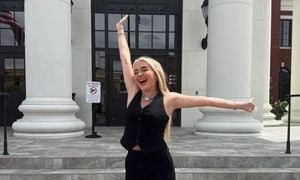The casting of Laura Bailey as Abby Anderson in the critically acclaimed video game The Last of Us Part II was surrounded by controversy before she even stepped onto the digital stage. Initially, there were doubts within Naughty Dog about Bailey’s suitability for the role, largely due to her extensive resume and recognition across the gaming industry.
According to Neil Druckmann, the director and co-creator of the game, this hesitation stemmed from the concern over Bailey's high profile. "She's in everything," Druckmann stated during a panel at the DICE event. This comment sums up the dilemma faced by the studio: could Bailey separate herself from the characters she had previously portrayed and authentically embody Abby?
Onstage with Cory Barlog, creative director of Santa Monica Studio, Druckmann shared insights on casting the pivotal role of Abby, who is central to the game's plot and player experience. Given the controversial nature of Abby's character and her significant role, it was imperative to find the right actor. Initially, both Druckmann and the Santa Monica team were hesitant, believing someone else might be more suitable for the task.
"I was sure it was going to be a different actor," Druckmann remarked, recalling the audition process where he watched live performances of potential candidates. Bailey’s past performances, particularly her prominent roles, loomed large, leading to reservations about the authenticity she could bring to Abby.
Yet, as the audition tapes were critically evaluated, Druckmann noticed something unique about Bailey's portrayal. "The tipping point came after studying the audition videos 'frame-by-frame,'" he explained. It was not merely Bailey's skills but her ability to express vulnerability—something the other auditioners failed to showcase—that changed his mind.
By highlighting this pivotal moment, Druckmann was able to convince the rest of the team. The decision, he noted, proved fortuitous as Bailey delivered a performance for which she would later receive widespread acclaim, including the Best Performance award at the 2020 Game Awards.
Bailey, who has lent her voice to numerous iconic characters across various media, brought Abby to life with such intensity and depth, she sparked significant online discourse—both positive and negative. Her character was user-mocked and met with fierce criticism from segments of the gaming community, mainly due to her actions and the narrative shift, which forced players to grapple with conflicting loyalties to characters from the original title.
The backlash reached troubling heights, resulting in Bailey receiving harrowing threats against her life and her family. During discussions about the ramifications of her role, Bailey revealed, "Real hardcore death threats" were so severe, they necessitated police involvement.
Even Kaitlyn Dever, who has since been announced as the actress portraying Abby for the second season of HBO’s adaptation of The Last of Us, faced her own set of security issues during filming due to the toxicity associated with the character.
While the conversation around Bailey’s casting was fraught with tension, it also underscored the broader cultural dynamics at play within the gaming world where the lines between character and actor can become fiercely blurred. Despite the adversity Bailey faced, she expressed satisfaction with the results, even stating her willingness to reprise her role if the opportunity arises.
Reflecting on the challenges of bringing Abby to life, this casting decision serves as not only a pivotal moment for Bailey but also as significant commentary on the evolution of character representation and audience engagement within the gaming industry. The Last of Us Part II was met not only with praise but also with contention—a balance Bailey navigated with both vulnerability and strength, forever changing the contours of character portrayal.



